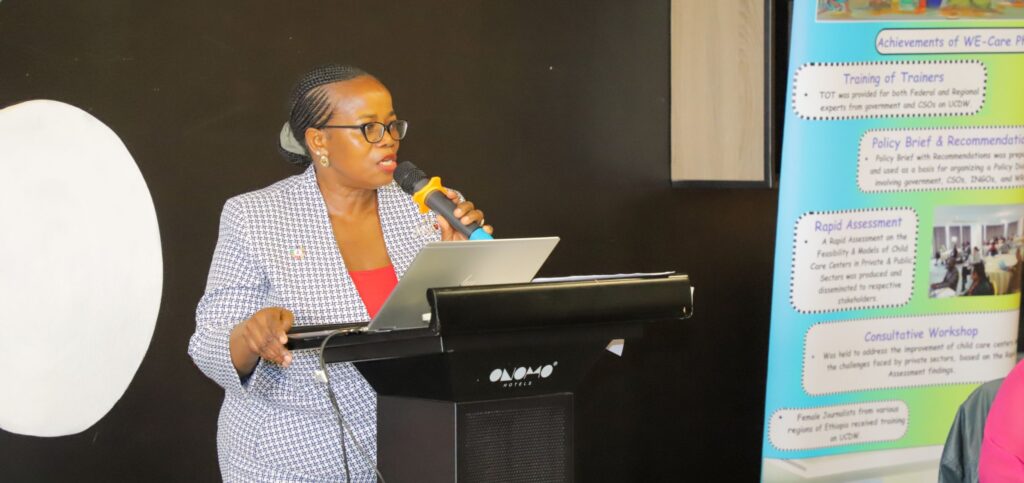Ugandan Commissioner calls for urgent action on unpaid care work at WE-Care Learning Event

Angela Nakafeero, Commissioner for Gender and Women’s Affairs of the Ugandan Ministry of Gender, Labour, and Social Development (MoGLSD), delivered a compelling keynote address at the recent WE-Care Annual Learning Meeting in Kampala, Uganda, held from August 5 to 8, 2024. Addressing a diverse group of stakeholders from across Africa, Commissioner Nakafeero highlighted the critical need for concerted efforts to address the pervasive issue of unpaid care and domestic work (UCDW) and its disproportionate impact on women and girls.
Speaking at the celebratory event marking the first year of WE-Care Phase V, Commissioner Nakafeero provided a comprehensive overview of the challenges surrounding UCDW in the Ugandan context. She emphasized that these essential yet often invisible tasks, encompassing direct care for vulnerable individuals and indirect domestic work, are overwhelmingly carried out by women and girls without expectation of pay. This unequal distribution, she argued, significantly hinders women’s economic empowerment and perpetuates gender inequality.
Drawing on real-life experiences, Commissioner Nakafeero shared a poignant anecdote from a participant who struggled to balance professional responsibilities with caring for a sick child, illustrating the daily frustrations faced by many working mothers. She further outlined key realities in Uganda, including the fact that women in households with dependents dedicate significantly more time to UCDW, limiting their participation in paid employment. Societal norms, she noted, often burden women with these responsibilities, pushing them towards informal work arrangements for flexibility. The COVID-19 pandemic, she added, further exacerbated these pressures.
However, Commissioner Nakafeero also outlined the proactive steps being taken by the Government of Uganda (GoU) to address this critical issue. She detailed the “5Rs and P” strategy – Recognize, Reduce, Redistribute, Reward, Represent, and Partner – as the government’s deliberate approach to freeing women and girls from the heavy burden of UCDW. This strategy includes the development of comprehensive care systems that are inclusive and consider the diverse needs of the population. The GoU aims to establish a holistic care ecosystem encompassing legal frameworks, services, financing, infrastructure, and programs, ultimately fostering a new social organization of care where responsibility is shared more equitably.
Looking to the future, Commissioner Nakafeero stressed the growing financial and safety costs associated with UCDW for women, as well as the concerning rise of gender-based violence. She passionately called for greater involvement of men in care work and emphasized the need for deliberate societal shifts. Furthermore, she highlighted the impact of climate change on UCDW, particularly through resource scarcity, and urged the adoption of climate-smart innovations. Investment in technology and the capacity building of care workers were also identified as crucial areas for future focus, requiring strategic engagement from both the public and private sectors.
In her powerful concluding remarks, Commissioner Nakafeero underscored the universal nature of vulnerability and the paramount importance of investing in care and support work. She urged participants and governments alike to be intentional and focused in their efforts, emphasizing the necessity of collaboration and strategic planning to effectively tackle the challenges of UCDW and pave the way for a more inclusive and equitable society for African women and girls. Her address served as a powerful call to action, setting a clear direction for the WE-Care program and its partners in the years to come.
